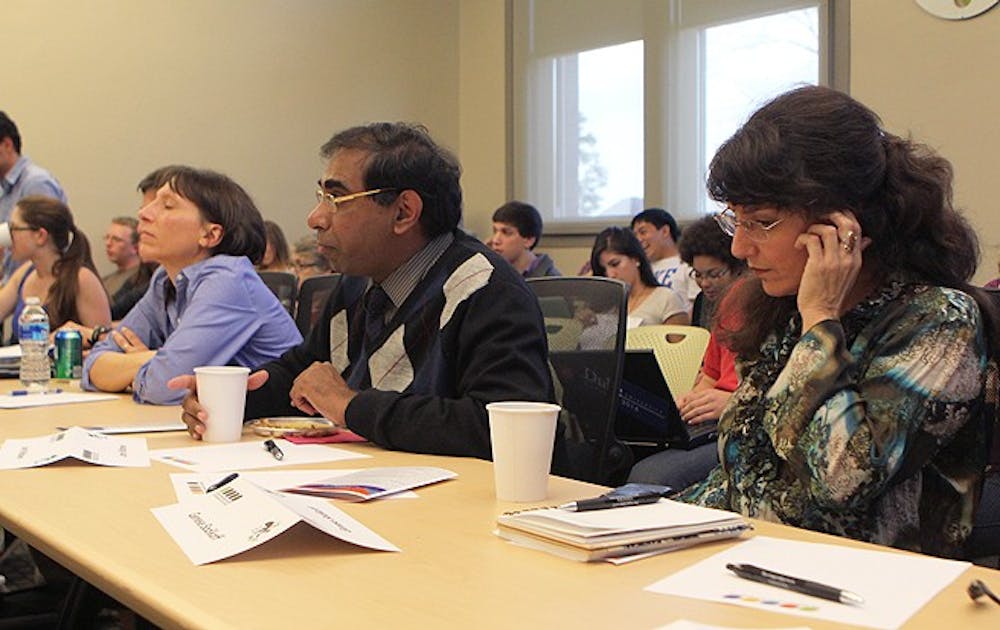The Duke Lemur Center, which has the largest population of lemurs outside of Madagascar, held its first symposium Monday in conjunction with the Kenan Institute for Ethics to discuss environmental issues facing Madagascar and its endangered lemurs.
The day-long conference, “Forests, Families, Lemurs, & Guitars: Rights to Madagascar’s Resources,” focused on the political, social and economic issues affecting Madagascar in the wake of an ecological crisis. The day began with an introduction to lemurs and the destruction of their habitat—90 percent of Madagascar’s original forest that has been destroyed—and ended with a concert at Duke Coffeehouse by singer, songwriter and Madagascar native Razia Said.
“Madagascar is a beautiful and unique place, but we’ve learned today it is also really messy,” said Duke ecologist Meredith Barrett, Nicholas ‘11. “There are a lot of issues to tackle, and it requires a multidisciplinary approach.”
The event included panel discussions with experts on the state of conservation in Madagascar, the implications of deforestation there and the fight against timber thieves.
Barrett spoke about the ecological crisis in Madagascar. Increasing erosion, soil depletion and slash and burn agriculture have taken their toll there. Deforestation also results in the introduction of non-native species, which can further deplete the land’s resources. The forms of damage are difficult to reverse and can take years to repair. She noted that governments in Africa lack control over the issue.
“African governments have little to no control in remote areas of the country where forests are, and as a result, government policies and projects have to be credible as well as sanctioned,” she added.
Patrick Duggan, Law ’10 and attorney with the U.S. Department of Justice Environmental Crimes Section, spoke about combatting the illegal trade of timber in the United States and around the world. Duggan investigates and prosecutes groups who smuggle protected plants and animals, such as those illegally taken from Madagascar.
One of the main issues Duggan faces in his work is proving that a product came from an illegal source and then convincing a jury that the importer knew it was illegal. Duggan noted that America is unique in having enough resources for the government to conduct these investigations and punish criminals.
Said spoke during the day about using her music career to effect change in the country. Speaking out against habitat destruction can be dangerous in Madagascar—without government protection, activists run the risk of being harmed or even killed, she noted.
Using music rather than protest helps by inspiring conversation instead of simply making demands, Said explained. She hopes that through her music, natives will better understand the devastating effects of cutting and burning down the forests and illegal trade.
“Even though people are not stopping what they’ve done… it’s beginning to sink in [to them] that habitat destruction is a problem,” noted Said.
After the panels, Said performed to a packed Duke Coffeehouse, where a crowd of students, lemur specialists and graduate students danced and listened to the Malagasy tunes.
One audience member, Duke Lemur Center postdoctoral researcher Erik Patel, knew Said from his experience spending 10 months out of the year in Madagascar researching the critically endangered silky sifaka lemur species.
“Razia is a symbol is Madagascar,” Patel said. “She’s quite well known. She has a first-hand perspective and the crisis in Madagascar has struck her home.”
Said herself seemed to be enjoying her time at Duke.
“Performing at universities, especially ones like Duke that are doing conservation and research, is the best way to perform and deliver message,” Said noted. “They have predispositions that connect them better to the music and cause.”
Cord Peters and Danielle Muoio contributed reporting.
Correction: An earlier version of this story implied that the conference was held exclusively held by the Duke Lemur Center. The Kenan Institute for Ethics co-hosted the event. The Chronicle regrets the error.
Get The Chronicle straight to your inbox
Signup for our weekly newsletter. Cancel at any time.

